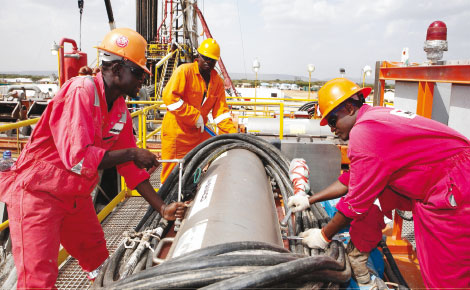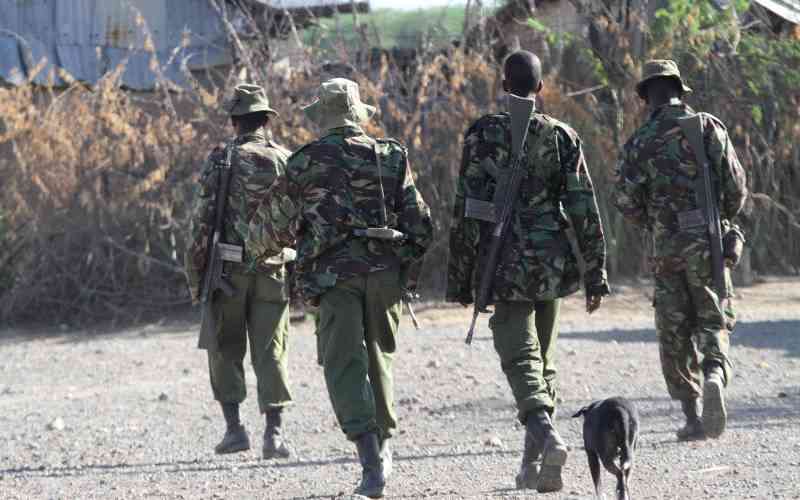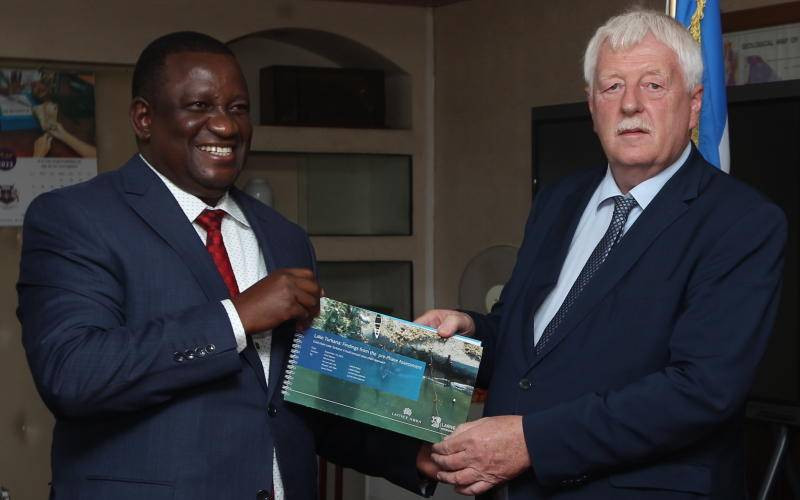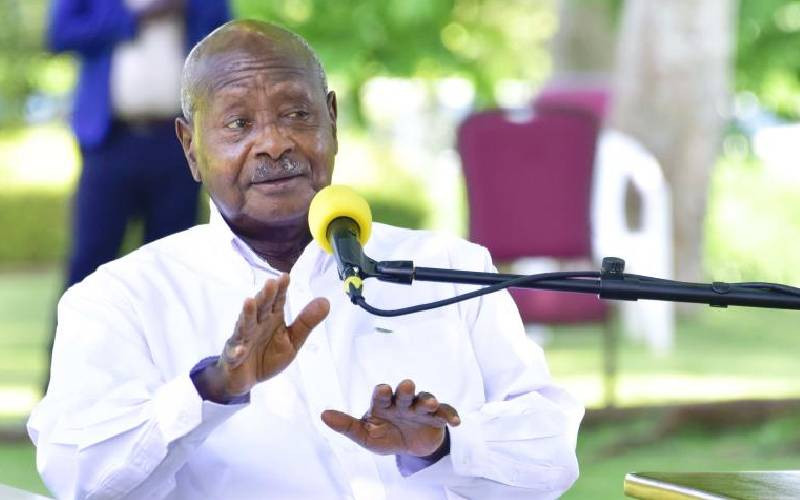 |
|
Engineers at the Turkana drilling site. [Photo: Kiundu Waweru/Standard] |
By Kiundu Waweru
[email protected]
Turkana, Kenya: In 1984, the hot deserts of Turkana got a global attention. Seen as a Godforsaken land of the hungry and malnourished, the world was reminded life could as well have begun in Turkana. A skeleton of a boy who may have lived 1.6 million years ago was discovered.
Two years later, a seemingly unrelated event occurred. An Irish accountant started an oil company, named after the town of Tullow in South of Dublin, Ireland. Twenty years later in 2012, Aidan Heavey, CEO, Tullow Oil PLC put Turkana again on the world map, in a big way.
The two discoveries, the only almost complete skeleton of a human related fossil ever found in the world, and of the low sulphur, high-wax crude oil, has not only seen Tullow partner with the National Museums of Kenya to preserve other fossils during exploration, but could be related; the Turkana boy’s ancestors could just have conspired to save the dry region with liquid gold.
Unimagined, unexpected way
Crude oil is formed from buried organic matter, animal and plant remains that lived millions of years ago. The remains are covered in layers of clay, or mud that forms strata. Heat and pressure from these strata, in the right conditions turn the organic matter into crude oil and natural gas form. The National Museums of Kenya say Turkana, the Cradle of Mankind, holds the world’s richest record of human pre-history and longest and complete record of human ancestry dating 27 million years.
The dry land, home to the world’s largest desert lake also has a rich fossil heritage dating back into the dinosaur age, 100 million years. Though geologists and archaeologists are yet to link the story of fossils in Turkana and the oil find, geologists maintain that oil was formed millions of years ago.
Today, the area is still dry and miserable, with as recent as November, pictures of hungry locals running in Kenyan dailies. The county is still the poorest in Kenya according to a report released by Kenya National Bureau of Statistics and Society for International Development.
Titled, Exploring Kenya’s Inequality: Pulling Apart or Pooling Together, the study shows that 88 per cent of Turkanas live way below a dollar a day.
Ironically, Turkana’s underbelly is flowing with riches, with close to 400 million barrels of crude oil and 250 billion cubic meters of water.
Commencement of the production of the reserves will take some time as Tullow with its partners are still exploring more blocks for oil. But the local expectation is up and anxious, in what an oil and gas expert at the Twiga-1 Camp calls “unrealistic.”
But the locals cannot help it as they witness the expansive Turkana land, kept company by thickets and rocky hills for ages changing to hitherto unimagined, unexpected way. The skyline has suddenly been filled with helicopters and airplanes, which land in Kapeso, the airstrip near Lokichar and Tullow’s operations field, with a fury.
To put things into perspective, the journey must begin at the Wilson Airport, Nairobi.
Turkana’s another chance Tullow Oil Company has its own lounge at the Airport’s Lengai house, where as early as 6am, people, staff, visitors and contractors are sipping coffee and snacks as they check in to travel to Turkana.
Stay informed. Subscribe to our newsletter
Following Tullow’s closure of operations on October 26 after the community protests, about 800 people were evacuated, with the Airstrip busy as a bee.
Operations resumed on November 7 and the Lounge went a notch busier. Six to seven Aircrafts would ferry people to Kapeso every day.
The planes would immediately fly back to Nairobi with a few guests, or completely empty.
On a normal day, three to two flights leave for Tullow, a flying distance of one hour, and twenty minutes.
An agent at Tullow’s Lounge in Wilson says in his work experience, he has seen nothing like it.
But this is nothing, compared to the world’s number one Oil and Gas Company, Saudi Aramco that generates over one billion US dollars daily in revenues; it is the only private company allowed to own and operate its own airports.
You feel the might of the Oil Industry, and the organisational power muscle of Tullow, Africa’s leading independent oil company listed at the London, Irish and Ghana stock exchanges at Kapeso.
Bandit prone
As soon as the plane lands, sometimes two or three within minutes of each other, a hurried security officer gathers everyone for a security briefing.
“This is a bandit prone area,” he begins, “they use spears and sometimes guns, AK 47s.”
The security officer, walkie talkie gurgling in hand adds that Kenya has recently been a victim of terror attacks though they do not expect such in Turkana, but one must be careful: “In case of gunshots, you are advised to lie and stay down.”
He adds that armed guards secure the camps, Twiga, Agete, Ngamia and Etuko and Ekales.
Following the protests, the camps were provided with police guards who have camped just outside the tented camp.
At the camps, which besides the drilling rigs contain the offices and residential areas, from the gate are security colour codes, which keep on changing according to the situation.
At the Twiga South- 1 Camp, no nonsense guards mount a thorough check. Even staffs that drive off briefly are scrutinised as they come back. There are all kinds of people. The guard’s first question: “Which country are you from?”
A quick perusal of the entry’s book shows the people ahead of us are from USA, Britain, Canada… “It is like a United Nations in the desert”, one guest marvels.
Twiga Camp is run like a military facility. A guest, no matter how brief the stay, must be inducted. The control is in line with the Oil Industry practices, where safety and security is the keyword.
Fairly urban
There are junior and senior messes. At the senior mess, meals are a four-course affair. No alcohol is served.
Besides alcohol, rig workers tell us they are not allowed to ‘see’ a woman. They stay at the Camp for twenty-eight days, doing backbreaking work and then break for 28 days.
As they change shifts, they carry two months’ worth of pay, with the unskilled rig workers taking home about Sh80,000, a month. Double that, and you have changed fortunes in Lokichar. Roads in Turkana are non-existent and transport is not assured.
Thus the workers spend a night at Lokichar as they try to arrange for transportation home. Guesthouses are sprouting, with one, Another Chance, proclaiming Turkana’s changing fortunes.
Lokichar is fairly urban, though you will find some locals dressed in traditional attire shepherding livestock that stroll leisurely on the once tarmacked road.
This has caused another headache for Tullow and an opportunity for the locals. While transporting the mammoth structure that makes- up the oil rigs, tens of trailers snake into the area in droves.
Also now a daily occurrence are shuttles ferrying staff to Tullow and heavy four wheel drives, a ripe recipe for accidents.
This has seen the need for Road Marshals, locals who keep the children, and even adults and livestock from the roads.
Tullow employs community stakeholders. One of them, not authorised to speak to the media- they work more like the government, willing to give information anonymously, (press releases also first sent to international agencies) says it is this change among other investments like drilling of boreholes, generators lighting the Camps and Rigs like a megacity that has seen increased interests and demands for jobs and benefits.
Oil industry
But Turkana, and Kenya is yet to see what it means to have an oil industry. Heavey, the Tullow CEO in an interview talking with CNBCAfrica on November 3, 2011 expounded on what it takes to set up an oil sector in a new territory.
He said in a country like Uganda, which is landlocked, its biggest challenge was putting facilities and infrastructure in place.
Also, there is need for local companies to service the industry; capacity building… “We need to even develop agriculture.”
These challenges are similar to what they later faced in Turkana and he says it is a huge project that calls for “mega investments,” as their interest in Kenya has a huge acreage compared to Uganda.
In the latter, they invested over 10billion US dollars. “The investments will transform East Africa which has been ignored for a long time.”
During our Tullow visit, the company had just resumed after the abrupt closure following the community protests.
A senior Tullow field officer confidently told us that the company incurred “millions in losses.” At the time, Agete-1 was drilling and it had to shut down, “which is a nightmare to any oil explorer.”
Three weeks after resuming drilling Agete-1, exploration Block 13T became the fifth well to hit oil, which has got the Turkana and Kenyans all excited and wondering why the country is not already minting money from the Oil.
 The Standard Group Plc is a
multi-media organization with investments in media platforms spanning newspaper
print operations, television, radio broadcasting, digital and online services. The
Standard Group is recognized as a leading multi-media house in Kenya with a key
influence in matters of national and international interest.
The Standard Group Plc is a
multi-media organization with investments in media platforms spanning newspaper
print operations, television, radio broadcasting, digital and online services. The
Standard Group is recognized as a leading multi-media house in Kenya with a key
influence in matters of national and international interest.
 The Standard Group Plc is a
multi-media organization with investments in media platforms spanning newspaper
print operations, television, radio broadcasting, digital and online services. The
Standard Group is recognized as a leading multi-media house in Kenya with a key
influence in matters of national and international interest.
The Standard Group Plc is a
multi-media organization with investments in media platforms spanning newspaper
print operations, television, radio broadcasting, digital and online services. The
Standard Group is recognized as a leading multi-media house in Kenya with a key
influence in matters of national and international interest.








